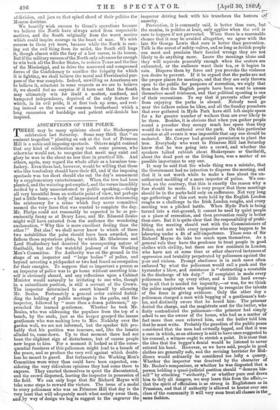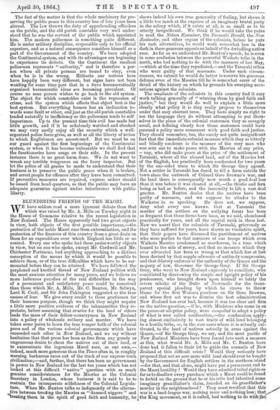ASSUMPTIONS OF THE POLICE.
rRE may be many opinions about the Shakespeare celebration last Saturday. Some may think that "an eminent tragedian" planting an oak at the foot of Primrose Hill is a noble and imposing spectacle. Others might contend that any kind of celebration may teach some persons, who otherwise would not, to recognize that merit may exist and glory be won in the closet no less than in practical life. And others, again, may regard the whole affair as a harmless tom- foolery. Even these last, however, would be willing that those who like tomfoolery should have their fill, and if the imposing spectacle was too short should eke out the day's amusement by a supplementary entertainment. When the tree had been planted, and the watering-pot emptied, and the verses inaudibly recited by a lady unaccustomed to public speaking,—things all very beautiful from an testhetic point of view, but perhaps just a little tame,—a body of impassioned orators denouncing the aristocracy for a crime which they never committed seemed the very farce that was wanted to complete the day. Mr. Phelps could not reasonably be expected to be as pre- eminently funny as at Drury Lane, and Mr. Edmond Beales might well have extorted from the audience the wondering exclamation, "Why this is more excellent fooling than the other !" But alas ! we shall never know to which of these two notabilities the palm should have been awarded, nor fathom those mysterious plots, by which Mr. Gladstone and Lord Shaftesbury had deceived the unsuspecting nature of Garibaldi, but not the watchful jealousy of the Working Men's Committee. For Authority was on the ground in the shape of an inspector and "large bodies" of police, and beyond arresting a pickpocket or two had found no occupation for their energies. To suppose that so important a person as an inspector of police was to go home without asserting him- self is obviously absurd, and any reflections upon a Cabinet Minister would naturally be irritating to one who, though in a subordinate position, is still a servant of the Crown. The inspector determined to assert himself by silencing Mr. Beaks. Fortunately a general order existed forbid- ding the holding of public meetings in the parks, and the inspector, followed by "more than a dozen policemen," ap- proached the learned gentleman. Whether he took Mr. Beales, who was addressing the populace from the top of a bench, by the ancle, just as the keeper grasped the insane gentleman who was making love to Mrs. Nickleby over the garden wall, we are not informed, but the speaker felt pro- bably that his position was insecure, and, like the lunatic alluded to, came down. Up to that moment there had not been the slightest sign of disturbance, but of course people now began to hiss. For a moment it looked as if the conse- quential fussiness of this policeman might lead to a breach of the peace, and so produce the very evil against which doubt- less he meant to guard. But fortunately the Working Men's Committee were wiser than could have been expected, con- sidering the very ridiculous opinions they had come there to express. They exerted themselves to quiet the discontented, and the crowd dispersed, leaving the inspector in possession of the field. We can only hope that Sir Richard Mayne will take some steps to reward the victors. The issue of a medal to every policeman who was on Primrose Hill that day is the very least that will adequately mark what society owes them, by way of design we beg to suggest to the engraver the inspector driving back with his truncheon the horrors Of anarchy. - Prevention, it is commonly said, is better than cure, but the maxim, in politics at least, only applies when the evil is sure to happen if not prevented. When there is a reasonable chance that it may be avoided altogether, we agree with the late Sir George Lewis that cure is better than prevention. Talk is the surest of safety-valves, and so long as foolish people- can meet and proclaim their fancied wrongs they are not likely to do anything more. Leave the meetings alone and they will separate peaceably enough when the orators are exhausted, or the audience want their tea, or it begins to rain. Disperse them by force and you provoke the violence you desire to prevent. If it be argued that the parks are not the proper places for meetings, and that they are only thrown open to the public for purposes of recreation, we reply that from the first the English people have been wont to amuse. themselves moult tristement, and that political spouting is one of their recreations. To say that it prevents other people from enjoying the parks is absurd. Nobody need go near the talkers unless he likes, and all the Sunday preachers- that ever gathered in Hyde Park have still left ample space for a far greater number of walkers than are ever likely to be there. Besides, it is obvious that when you gather people round a preacher they occupy much less space than they would do when scattered over the park. On this particular occasion at all events it was impossible that any one should be molested. Mr. Cowper had granted permission to plant the tree. Everybody who went to Primrose Hill last Saturday knew that he was going into a crowd, and whether the speakers talked rubbish about Shakespeare or Garibaldi,. about the dead poet or the living hero, was a matter of no. possible importance to any one. It may be said that the whole thing was a mistake, that the Government had no intention to disperse the meeting, and that it is not worth while to make a fuss about the un- authorized meddling of a mere inspector of police. We con- tend, on the contrary, that this is exactly the reason why a fuss should be made. It is very proper that these meetings should be in the parks held only on sufferance. Not very long. ago gatherings of this sort were held by the English London roughs as a challenge to the Irish London roughs, and every meeting was a pitched battle. When Hyde Park is being turned into a riot-ground, it cannot be used by quiet people as a place of recreation, and then prevention really is better than cure. But it is quite clear that the responsibility of prohi- biting the meeting should rest with the Commissioners of Police, and not with every inspector who may happen to be labouring under a fit of self-importance. These sons of Sir Richard Mayne do take too much upon themselves. As a general rule they have the prudence to treat people in good clothes with civility, but there are few residents in London_ who have not at some time or other observed instances of oppression and brutality perpetrated by policemen against the poor and vicious. Prompt obedience is in such cases often enforced by what the policeman would call a push and the bystander a blow, and resistance is "obstructing a constable in the discharge of his duty." If complaint is made every policeman backs up every other, and a little hard swear- ing is all that is needed for impunity,—or was, for we think the police magistrates are beginning to recognize the talents of the force in giving evidence. Only the other day a policeman charged a man with begging of a gentleman's but- ler, and distinctly swore that he heard him. The prisoner denied the charge, and the magistrate sent for the butler, who flatly contradicted the policeman—the prisoner had simply asked to see the owner of the house, who had as a matter of fact more than once relieved him, and the butler told him that he must write. Probably the guardian of the public peace considered that the man had virtually begged, and that it was a case in which, as an attorney is said to have once suggested to his counsel, a witness ought to stretch a point. It is clear that the idea that the beggar's denial would be listened to never entered his head. However, as we have said, people in good clothes are generally safe, and the revising barrister for Mid- dlesex would ordinarily be considered too lofty a quarry. Whether the inspector was deceived by the character of Mr. Beales's companions, or whether he was disgusted that a person holding a quasi-judicial position should "demean his- self" by attacking "authority," or whether pure zeal drove him to defy all dangers, we may learn this from the affair,— that the spirit of officialism is as strong in Englishmen as in Prussians, and that if authority is allowed to hector over one class of the community it will very soon treat all classes in thew same fashion. The fact of the matter is that the whole machinery for pre- serving the public peace in this country has of late years been altered. The law throws the duty of apprehending offenders on the public, and the old parish constable very well under- stood that he was the servant of the public which appointed him. The modern policeman is something quite different. He is under military discipline, responsible only to his official superiors, and as a natural consequence considers himself as a part of the Government of the country. We have adopted the Continental system, and with its advantages are beginning to experience its defects. On the Continent the smallest policeman represents "authority," and is therefore a per- son whom all private persons are bound to obey, even when he is in the wrong. Hitherto our notions here have happily been very different, but signs have not been wanting for some time past that in a force bureaucratically organized bureaucratic ideas are becoming prevalent. Of course no sane person wishes to go back to the old system. The object for which constables exist is the repression of crime, and the system which effects that object best is the best system. But everything human has an inclination to- wards some fault or other, and just as the old parish constables tended naturally to inefficiency so the policeman tends to self- importance. Up to the present time this evil has made but little growth, and if it be sedulously watched and checked we may very easily enjoy all the security which a well- organized police force gives, as well as all the liberty of action to which Englishmen are accustomed. But we must be on our guard against the first beginnings of the Continental system, or when it has become unbearable we shall find that the functionaries have usage on their side. In the present instance there is no great harm done. We do not want to wreak any terrible vengeance on the fussy inspector. But let the police of all grades be made to understand that their business is to preserve the public peace when it is broken, and arrest people for offences after they have been committed. If preventive measures are required, express orders should be issued from head-quarters, so that the public may have an adequate guarantee against undue interference with public liberty.



































 Previous page
Previous page